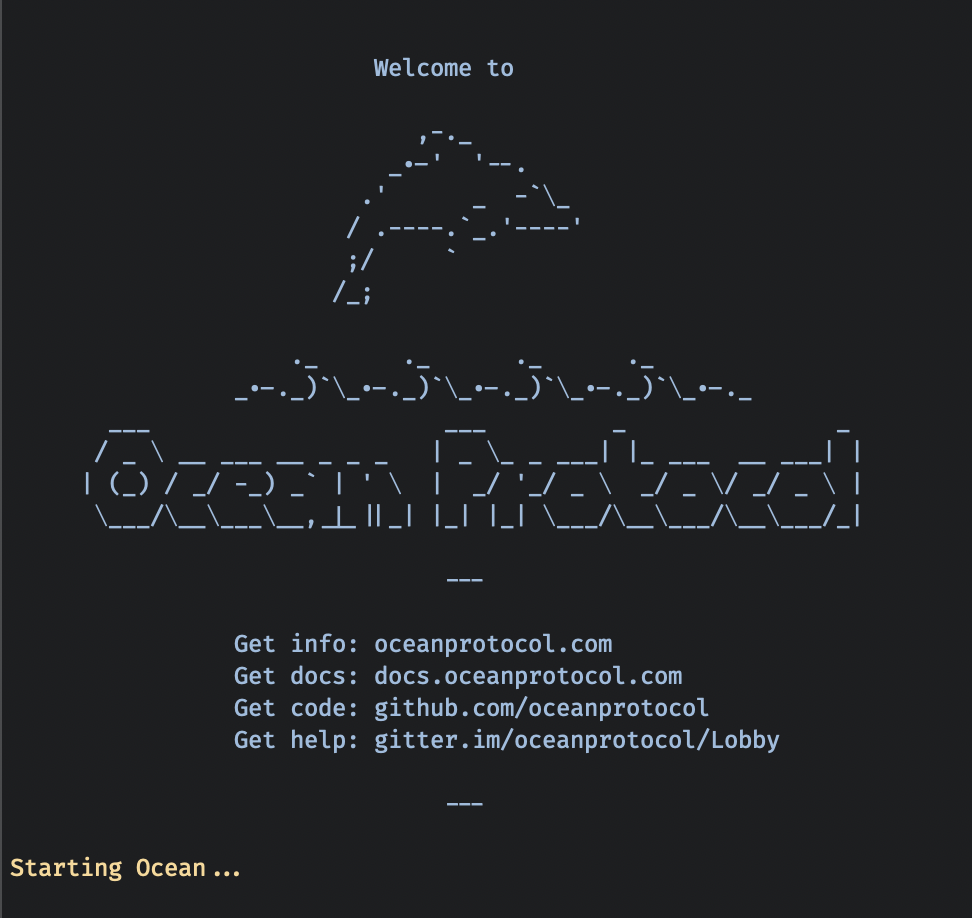7.6 KiB
barge
🐳 Docker Compose files for the full Ocean Protocol stack.
Prerequisites
You need to have the newest versions of:
- Linux or macOS. Windows is not currently supported. If you are on Windows, we recommend running Barge inside a Linux VM. Another option might be to use the Windows Subsystem for Linux (WSL).
- Docker
- Docker Compose
Get Started
If you're new to Barge, it's best to start with the defaults:
git clone git@github.com:oceanprotocol/barge.git
cd barge
./start_ocean.sh
That will run the current default versions of Aquarius, Provider, Ganache.

It's overkill, but to be sure that you use exactly the Docker images and volumes you want, you can prune all the Docker things in your system first:
docker system prune --all --volumes
Options
The startup script comes with a set of options for customizing various things.
Component Versions
The default versions are always a combination of component versions which are considered stable.
| Aquarius | Provider | Ganache | ocean-contracts |
|---|---|---|---|
vx.x.x |
vx.x.x |
latest |
test |
You can override the Docker image tag used for a particular component by setting its associated environment variable before calling start_ocean.sh:
AQUARIUS_VERSIONPROVIDER_VERSIONCONTRACTS_VERSION
For example:
export AQUARIUS_VERSION=v2.0.0
./start_ocean.sh
All Options
| Option | Description |
|---|---|
--no-aquarius |
Start up Ocean without the aquarius Building Block. |
--no-provider |
Start up Ocean without the provider Building Block. |
--no-ganache |
Start up Ocean without the ganache Building Block. |
--no-dashboard |
Start up Ocean without the dashboard Building Block. |
--mongodb |
Start up Ocean with MongoDB as DB engine for Aquarius instead of Elasticsearch. |
--force-pull |
Force pulling the latest revision of the used Docker images. |
--purge |
Removes the Docker containers, volumes, artifact folder and networks used by the script. |
--exposeip |
Binds the components to that specific ip. Example: ./start_ocean.sh --exposeip 192.168.0.1 |
Docker Building Blocks
Barge consists of a set of building blocks that can be combined to form a local test environment. By default all building blocks will be started by the start_ocean.sh script.
Aquarius
By default it will start two containers (one for Aquarius and one for its database engine). By default, Barge will use Elasticsearch for its database engine. You can use the --mongodb option to use MongoDB instead.
This Building Block can be disabled by setting the --no-aquarius flag.
| Hostname | External Port | Internal URL | Local URL | Description |
|---|---|---|---|---|
aquarius |
5000 |
http://aquarius:5000 | http://localhost:5000 | Aquarius |
elasticsearch |
The Elasticsearch used by Aquarius | |||
mongodb |
The MongoDB used by Aquarius |
Provider
| Hostname | External Port | Internal URL | Local URL | Description |
|---|---|---|---|---|
provider |
8030 |
http://provider:9000 | http://localhost:8030 |
Ganache
| Hostname | External Port | Internal URL | Local URL | Description |
|---|---|---|---|---|
ganache |
8545 |
http://ganache:9000 | http://localhost:8545 |
ocean-contracts
- Deploy all smart contracts from the ocean-contracts repo
- Export artifacts files (.json) to default shared folder between all containers
- Create address file (address.json) that has the address of each deployed smart contract that is required by the ocean library. This file is saved to the same folder with the artifacts files
| Hostname | External Port | Internal URL | Local URL | Description |
|---|---|---|---|---|
ocean-contracts |
The accounts can be accessed with this seed phrase:
taxi music thumb unique chat sand crew more leg another off lamp
Alternatively, you can pass your own mnemonic with GANACHE_MNEMONIC.
Dashboard
This will start a portainer dashboard with the following admin credentials and connects to the local docker host. This Building Block can be disabled by setting the --no-dashboard flag.
- User:
admin - Password:
oceanprotocol
| Hostname | External Port | Internal URL | Local URL | Description |
|---|---|---|---|---|
dashboard |
9000 |
http://dashboard:9000 | http://localhost:9000 | Portainer |
Contributing
See the page titled "Ways to Contribute" in the Ocean Protocol documentation.
License
Copyright 2020 Ocean Protocol Foundation
Licensed under the Apache License, Version 2.0 (the "License");
you may not use this file except in compliance with the License.
You may obtain a copy of the License at
http://www.apache.org/licenses/LICENSE-2.0
Unless required by applicable law or agreed to in writing, software
distributed under the License is distributed on an "AS IS" BASIS,
WITHOUT WARRANTIES OR CONDITIONS OF ANY KIND, either express or implied.
See the License for the specific language governing permissions and
limitations under the License.
